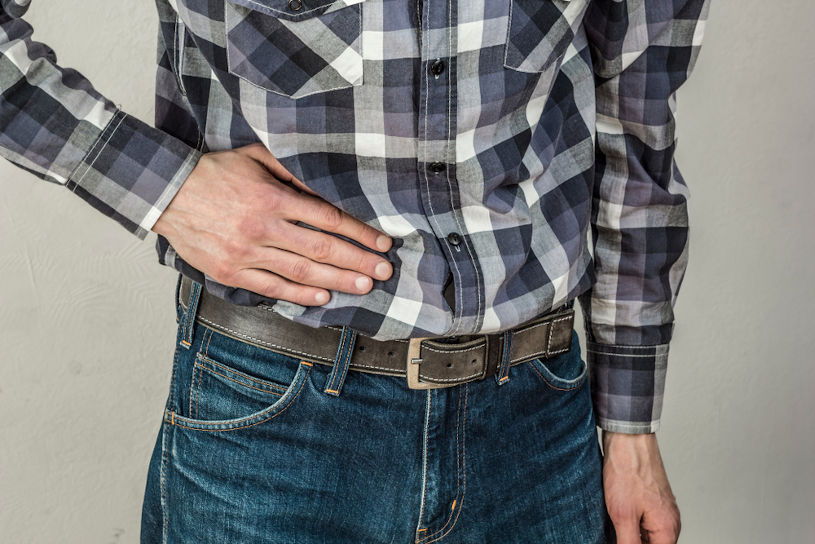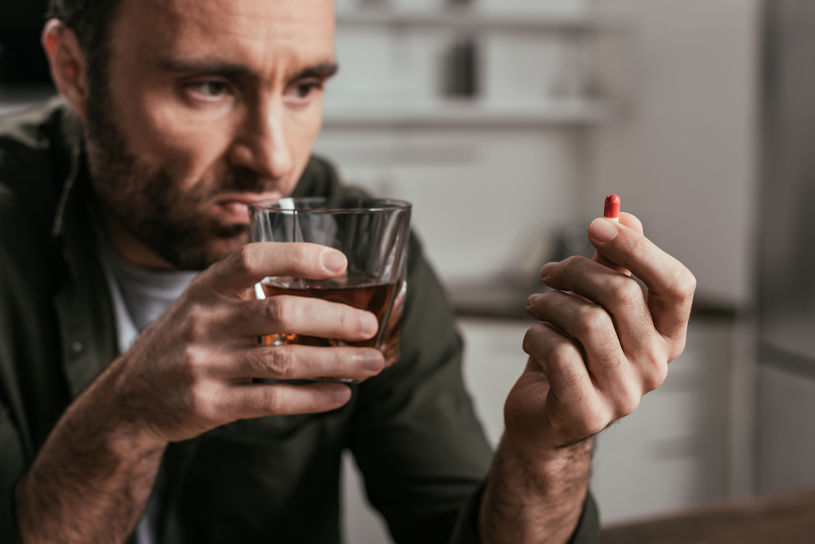Nowadays, the subject of alcohol and Tylenol (acetaminophen) use is not discussed as much as it should, even though many people drink regularly, especially when socializing. Situations, where a person takes Tylenol together with the spirits, drink to relieve pain or fever are not uncommon. What happens when acetaminophen and alcohol are taken together? Do severe complications occur? What to expect when Tylenol and alcohol are mixed, and what should everyone know about this, especially if someone has done it on multiple occasions? Read on to find out.
Table Of Contents:
- Is It Safe To Mix The Two?
- What Are The Health Risks?
- Are AUD And Acetaminophen Overdose Connected?
- What Are OD Risk Factors?
- Is There A Safe Dose To Take With Tylenol?
- What Should One Do If Accidentally Took Alcohol With Tylenol?
- Are There Alternatives To Tylenol Which Are Safe With Alcohol?
- When To See A Doctor If Mixed These Two Substances?

Is It Safe To Mix Tylenol And Alcohol?
Most people take this over-the-counter pill at one point or another to relieve fever or pains and aches. Still, the Tylenol-alcohol subject requires more attention to avoid potential complications. Generally speaking, taking Tylenol with liquor is not always safe. Just like with many other medications, the human body metabolizes acetaminophen in the liver. When the recommended dosage is taken, the liver converts most of the drug into a benign substance, then eliminates it from the body via urine. The body converts a small byproduct of metabolized Tylenol into a toxic substance, which can be quite dangerous for liver health. But, glutathione or a secondary substance minimizes the toxic effects of the drug.
Taking too much acetaminophen can cause toxic metabolites to build up and damage the liver. This can also happen when glutathione levels are low. Liquor is also metabolized by the liver and utilizes glutathione to downplay the adverse effects.
Over time, especially with excessive drinking, glutathione levels can deplete, and the liver becomes more sensitive. Mixing alcohol and acetaminophen can be considered relatively safe in small doses, but excessive dosages can cause side effects that range from mild to severe.
Risks Of Mixing Tylenol And Alcohol
As seen above, mixing liquor and this common pill is not always safe. How long after taking Tylenol can one drink alcohol? The answer is not quite simple and depends on a few factors, including how big the person is, Tylenol dosage, duration of use, and drinking habits.
Speaking of Complications, Common Risks, and Side Effects that Happen When These Two Substances are Mixed Include:
- Rapid heartbeat
- Upset stomach
- Liver damage
- Ulcers and bleeding
- Kidney damage
The risk of the symptoms mentioned above increases when mixing acetaminophen and alcohol in higher doses. For example, mixing Tylenol 3 and alcohol can cause severe side effects, including death.

AUD And Acetaminophen Overdose
Acetaminophen overdose occurs when a person intentionally or accidentally takes more than the medicine’s recommended or average amount. Acetaminophen overdose is one of the most common poisonings, and it is a crucial point to address, especially when it is related to AUD. Alcoholism weakens the liver and increases the risk of many diseases, such as cirrhosis and fatty liver disease.
Bearing in mind that liver functions decrease due to excessive drinking, the risk of acetaminophen overdose increases.
Can one drink alcohol after taking Tylenol? Most people don’t wonder about AUD cases and consequences that happen later. People who are battling AUD or have successfully beaten the addiction should bear in mind their liver is sensitive and probably damaged, so consulting a doctor about Tylenol effects could be practical. This is yet another reason why mixing Tylenol with alcohol is not a good idea.
The good news is that people with AUD who take recommended amounts of medicine are not at a higher risk of liver damage.
As long as dosages are appropriate, Tylenol can be tolerated, but this is not a green light to go ahead and drink when taking pills, particularly in people with AUD. In fact, the negative consequences of combining Tylenol extra strength and alcohol should be highlighted to discourage people. Still, they should also elucidate what would happen if people with AUD whose liver is damaged take this particular medicine. At this point, not enough attention is paid in public to the habit of taking Tylenol with alcohol.
People With Increased Risk Factors
Generally speaking, everyone who mixes paracetamol and alcohol is at risk of developing side effects. But, some people, including those who mix Tylenol 3 with alcohol, are at a higher risk than others.
These Risk Factors Include:
- AUD
- Liver disease
- Low levels of glutathione
- Infection
- Having some illness which damaged the liver
- Taking more Tylenol than necessary
In order to different weigh-in perspectives to determine if one can the two simultaneously, consider the above-mentioned risk factors.
To avoid Tylenol and alcohol interaction, people in the high-risk groups shouldn’t take medicine without consulting a pharmacist or their healthcare provider, just to be on the safe side.
Safe Dose Of Alcohol To Take With Tylenol
To understand the wait time, the important fact to bear in mind is that the half-life of the drug is four hours, after which blood levels of the drug start decreasing. Eight hours after taking the pill, the blood levels of acetaminophen lower by 75%, and in 12 hours, they reduce by 88%. Although combining drugs such as Tylenol PM and alcohol is not always the wisest idea of light drinking after six hours from the last dosage is generally tolerated by the body. Make sure to consult a healthcare provider and ask him if it is safe to take Tylenol with alcohol in order to avoid potential complications. This is particularly the case for stronger instances such as hydrocodone-acetaminophen alcohol.
Some people drink alcohol every day, but aches and pains can pop up, and this medicine can help eliminate them. Is there any possibility where drinking alcohol with Tylenol is okay?
Or in other words, when taking Tylenol before alcohol, is there a limit to avoid crossing in terms of drinking? Generally speaking, as long as Tylenol, after alcohol is taken as directed, drinking in moderation is okay. Here “in moderation” refers to not more than three drinks a day. Taking acetaminophen and alcohol one time can be okay but shouldn’t turn into a habit.
Note that each individual may react to the ethanol-paracetamol combination differently. That’s why it is essential to consult a medical professional before use.
What To Do If Accidentally Took Alcohol With Tylenol
Mixing Tylenol and alcohol doesn’t have to cause panic. If both substances are taken together, the answer is not to drink more alcohol and only take the recommended dose at the frequency mentioned on the label. To avoid complications of taking Tylenol PM with alcohol, the best thing to do is to stop drinking when taking medicine to alleviate pain or fever.
Any regular drinker may be wondering how long after liquor can one take Tylenol? The answer is not easy to find as resources on this subject are scarce. Acetaminophen and alcohol interaction may not occur if a recommended dosage is taken after having a drink in people with a healthy liver. But liquor and acetaminophen can induce various problems in people with a weak liver. Wait a few hours after a drink to take this medicine.
People with liver diseases should always ask for the doctor’s approval to avoid alcohol-acetaminophen syndrome. Its hepatotoxicity occurs from the therapeutic ingestion of paracetamol in moderate or heavy drinkers.

Alternatives To Tylenol Which Are Relatively Safe With Alcohol
Some people want to know whether there are alternatives that are safe with drinking. This is especially the case for people whose alcoholic parents had a bad habit of mixing their drinks with drugs and experienced side effects in return. The good news is that there are alternatives that don’t involve taking Tylenol PM and alcohol together.
Popular alternatives to acetaminophen include non-steroidal anti-inflammatory drugs (NSAIDs) such as aspirin and ibuprofen. NSAIDs work in a slightly different manner than acetaminophen and are usually fine to take with the drink. Of course, this isn’t a recommendation. Only a doctor shall determine whether benefits outweigh the risks for each individual case.
When To See A Doctor If Mixed These Two Substances
People tend to mix different substances such as caffeine and alcohol, drugs and drinks, and so much more, but don’t always think about potentially negative scenarios. For example, mixing hydrocodone acetaminophen and alcohol can cause severe complications, so a person should see or call the doctor right after. Mixing Tylenol with codeine and alcohol, especially in people with a damaged liver, can lead to further damage and serious symptoms. When to see a doctor after combining liquor with Tylenol depends on various factors, including drug dosage, amount of the drink, or whether a person has liver disease or not.
See the doctor if the above-mentioned symptoms associated with medicine side effects occur.
People who notice symptoms of liver disease may also want to see their doctor. These symptoms include jaundice, pain in the abdomen’s upper right side, swelling in the abdomen, loss of appetite, nausea and vomiting, tiredness, sweating, confusion, unusual bruising, or bleeding. Every person should consider the negatives as well to avoid having to see the doctor. If a friend or family member tends to do this without realizing that combining acetaminophen and drinks can lead to liver damage and other problems, referring them to a healthcare provider who will perform a CAGE assessment could help prevent potentially lethal consequences.
Is It Really Safe?
The paracetamol-alcohol relationship is complicated, but generally speaking, moderate drinking and taking pills as directed is relatively safe for a patient’s health. However, in people with liver damage, Tylenol and liquor death can be the most severe scenario that is bound to motivate people to avoid using medicine when drinking and vice versa. Before combining both, it’s useful to consult a healthcare provider or pharmacist.
It is also necessary to ask for help in the rehabilitation center in case there are any signs of addiction to alcohol. Alcoholism treatment is a way to start a new sober and free life.
Hope Without Commitment
Find the best treatment options. Call our free and confidential helpline
Most private insurances accepted
Page Sources
- Snider, N. T., Portney, D. A., Willcockson, H. H., Maitra, D., Martin, H. C., Greenson, J. K., & Omary, M. B. (2016). Ethanol and Acetaminophen Synergistically Induce Hepatic Aggregation and TCH346-Insensitive Nuclear Translocation of GAPDH. PloS one, 11(8), e0160982. https://doi.org/10.1371/journal.pone.0160982
- Prescott L. F. (2000). Paracetamol, alcohol and the liver. British journal of clinical pharmacology, 49(4), 291–301. https://doi.org/10.1046/j.1365-2125.2000.00167.x
- Fruchter, L. L., Alexopoulou, I., & Lau, K. K. (2011). Acute interstitial nephritis with acetaminophen and alcohol intoxication. Italian journal of pediatrics, 37, 17. https://doi.org/10.1186/1824-7288-37-17
- Hyman J. Zimmerman, Willis C. Maddrey,(1995). Acetaminophen (paracetamol) hepatotoxicity with regular intake of alcohol: Analysis of instances of therapeutic misadventure, Hepatology, Volume 22, Issue 3, https://doi.org/10.1016/0270-9139(95)90295-3
- Emby DJ, Fraser BN. Hepatotoxicity of paracetamol enhanced by ingestion of alcohol: report of two cases. S Afr Med J. 1977 Feb;51(7) 208-209. PMID: 847572.



